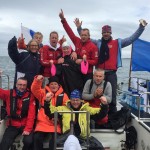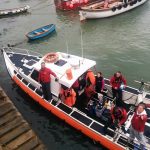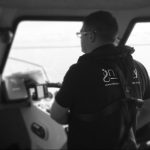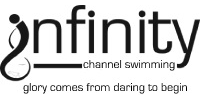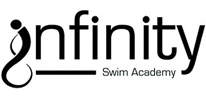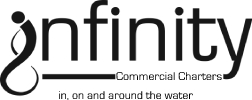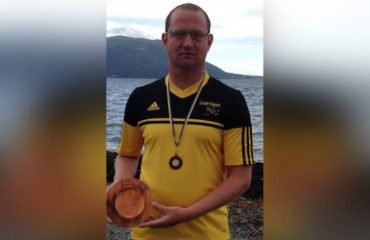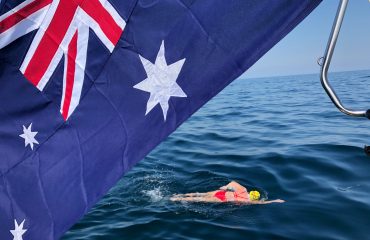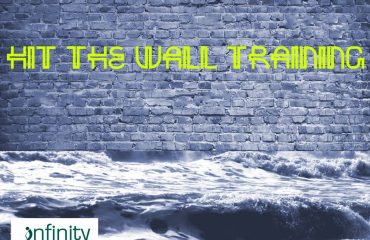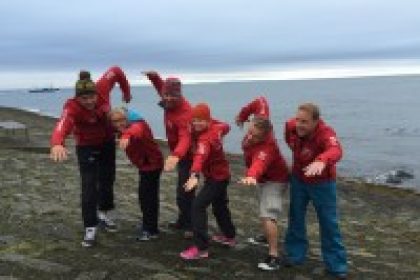
Pilot two-way course North Channel, Start: 7:52.00 am July 27th Landfall in Scotland: 11:33.06 pm Finish: 1:49.23 pm July 28th
Time: 29 hours 57 minutes 23 seconds Legs: Each team member swam 5 x 1 hour legs with Elina Makïnen’s 5th swim completed in 57 minutes Time from Ireland to Scotland: 15 hours 46 minutes Time from Scotland to Ireland: 14 hours 13 minutes.
Mallon explains the origins of the attempt, “
In February 2015 following the International Ice Swimming Association 1 km Championships in Murmansk, Russia, a group of swimmers formed to take on a challenge set that I set before them – something that had never before been achieved. In previous years, both Kevin Murphy and Alison Streeter MBE had attempted 2-way solo crossings of the notoriously challenging North (Irish) Channel from Ireland to Scotland to Ireland, but neither were successful and never before had a relay attempted this feat.”
Kaarma, Stramrood, Carin Nordin, Tlamicha, Corcoran and Makïnen had competed and all stood upon the podium at these championships. Their talents in ice and cold water swimming were augmented by a fast stroke rate (Kaarma, Stramrood, Carin Nordin, Tlamicha, Corcoran and Makïnen had competed and all stood upon the podium at these championships. Their talents in ice and cold water swimming were augmented by a fast stroke rate (
spm).
The Irish Long Distance Swimming Association offered the team a
window in July 2015. Fast and Frozen was the team name based on their collective ice swimming history and swim speed. “
They all arrived in Dublin from across the globe, raring to go. But Mother Nature delayed their plans with high winds and stormy weather. The original swim date of July 24th was pushed back and the team took some time to sightsee and rest. After many discussions about tides and weather, and an almost complete cancellation, the decision to go on July 27th was made.
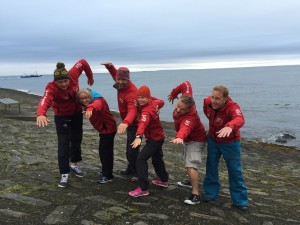
Team Fast and Frozen Relay Team 1st two way of the North Channel
The team arrived at Donaghadee Harbour with food boxes and kit bags packed for departure at 7 am with high water approaching. This would be a tough ask, but the training they all had completed in colder, rougher waters would help their attempt at a world first. They were taxied to Robbie’s Point on board Aquaholics II, a traditional start point of many of the North (Irish) Channel swims. Henri Kaarma was first to swim, entering the water at 7:48 am. He swam to the shoreline and raised his hands whilst standing on some barnacle-covered rocks. The claxon sounded and at 7:52 am under the watchful eyes of Pádraig Mallon, Richard, Gary and Milo McCourt, the swim started. The first set of six one-hour legs were met with rough waters and higher knot winds, but the team has been briefed on this possibility. They had expected the water conditions to be challenging. Originally planning for a 12-hour crossing, landfall was reached at Portpatrick, Scotland at 11:33.06 pm giving the team a one-way crossing of 15 hours 46 minutes 6 seconds crossing from Ireland to Scotland. After climbing down from the rocks and with the lights from the boat to guide his path, Patrick Corcoran commenced the return leg to Ireland. He still had over 15 minutes left to swim of his rotation.
Henri Kaarma was first to swim, entering the water at 7:48 am. He swam to the shore line and raised his hands whilst standing on some barnacle-covered rocks. The claxon sounded and at 7:52 am under the watchful eyes of Pádraig Mallon, Richard, Gary and Milo McCourt, the swim started. The first set of six one-hour legs were met with rough waters and higher knot winds, but the team has been briefed on this possibility. They had expected the water conditions to be challenging. Originally planning for a 12-hour crossing, landfall was reached at Portpatrick, Scotland at 11:33.06 pm giving the team a one-way crossing of 15 hours 46 minutes 6 seconds crossing from Ireland to Scotland. After climbing down from the rocks and with the lights from the boat to guide his path, Patrick Corcoran commenced the return leg to Ireland. He still had over 15 minutes left to swim of his rotation.
They had expected the water conditions to be challenging. Originally planning for a 12-hour crossing, landfall was reached at Portpatrick, Scotland at 11:33.06 pm giving the team a one-way crossing of 15 hours 46 minutes 6 seconds crossing from Ireland to Scotland. After climbing down from the rocks and with the lights from the boat to guide his path, Patrick Corcoran commenced the return leg to Ireland. He still had over 15 minutes left to swim of his rotation.
The claxon sounded and at 7:52 am under the watchful eyes of Pádraig Mallon, Richard, Gary and Milo McCourt, the swim started. The first set of six one-hour legs were met with rough waters and higher knot winds, but the team has been briefed on this possibility. They had expected the water conditions to be challenging. Originally planning for a 12-hour crossing, landfall was reached at Portpatrick, Scotland at 11:33.06 pm giving the team a one-way crossing of 15 hours 46 minutes 6 seconds crossing from Ireland to Scotland. After climbing down from the rocks and with the lights from the boat to guide his path, Patrick Corcoran commenced the return leg to Ireland. He still had over 15 minutes left to swim of his rotation. He returned to the boat at 11:53 pm having changed with Zdeněk Originally planning for a 12-hour crossing, landfall was reached at Portpatrick, Scotland at 11:33.06 pm giving the team a one-way crossing of 15 hours 46 minutes 6 seconds crossing from Ireland to Scotland.
After climbing down from the rocks and with the lights from the boat to guide his path, Patrick Corcoran commenced the return leg to Ireland. He still had over 15 minutes left to swim of his rotation. He returned to the boat at 11:53 pm having changed with Zdeněk Thalmika at 11.52 pm. Patrick responded, ‘Sure, I have no money with me,’ when he asked what did he bring the crew back from Scotland. He had only spent a short time of 3 minutes and 4 seconds on Scotland.
In the dark of the night, as July 28th arrived, one swimmer after another advanced toward their final destination with glow sticks attached to their swim caps and swim costume. Zdeněk changing to Elina for her first night swim, to Henri then to Ryan, then to Anna as the dawn approached back to Zdeněk, Elina, and so forth. Each exited the water after swimming fast but frozen. They were badly stung by
Lion’s Mane jellyfish that required prompt medical attention from their crew, then they re-warmed, hydrated, ate and slept before preparing for their next swim. Dawn came at 5:18 am as Zdenek swam into a 6-knot northeasterly wind. The promise of a slack tide was fulfilled and on Henri’s fifth swim that started at 7:52 am, the water settled and the skies cleared. Henri’s fast and efficient stroke gained the team some advances to land, but Dawn came at 5:18 am as Zdenek swam into a 6-knot northeasterly wind.
The promise of a slack tide was fulfilled and on Henri’s fifth swim that started at 7:52 am, the water settled and the skies cleared. Henri’s fast and efficient stroke gained the team some advances to land, but the land would be another few hours away although it seemed close.
Ryan was next to swim after he had recovered well from many stings to his face and upper torso. The slack tide brought a pod of dolphins including a mother and pup. It was a boost for the team to see such a sight with the thoughts that this friendly species was guiding them home. Ryan changed to Anna at 9:52 am. Despite having been stung quite a lot in her previous swims, Anna was adamant that this close to the finish, the jellyfish were not going to bother her. Having completed the Oceans Seven, Anna had earned the heart of a lion so this time Lion’s mane was not going to stop her. She swam at a rate of 80 spm with a northerly 2-knot breeze and encouragement from her team as the waters changed constantly and the rain continued.
Zdeněk made his final one-hour swim starting at 11:52 am on a tough tidal flow passing to Elina. Ireland was getting extremely close, but it was important that the relay formation maintained its sequence as Henri was prepared to swim again. The GPS was tracking 800 meters to landfall and Elina had 6 minutes to swim. With a smile she kicked her legs and rotated her arms all the faster and the shoreline came closer. At 1:49 pm on July 28th, she made landfall and raised her hands in the air to the sound of the boat claxon and the celebrations from the boat.
The second leg of the crossing took 14 hours 13 minutes and 13 seconds and set a new record time of 29 hours 57 minutes and 23 seconds. It was a world-first two-way relay crossing of the North Irish Channel by an international team. On return to the boat to cheers, Elina described how she felt like a mermaid climbing on to the rocks and how she could not see the beautiful emerald isle because of the tears in her goggles. The boat turned about and made its way to Donaghadee harbour Co. Down to the crowds who cheered them home. There are not many firsts left in the world. I hope that this inspirational feat will spur someone else to rise to their challenge.”

